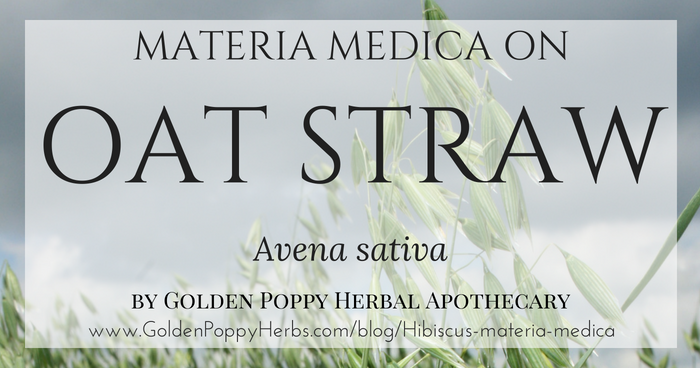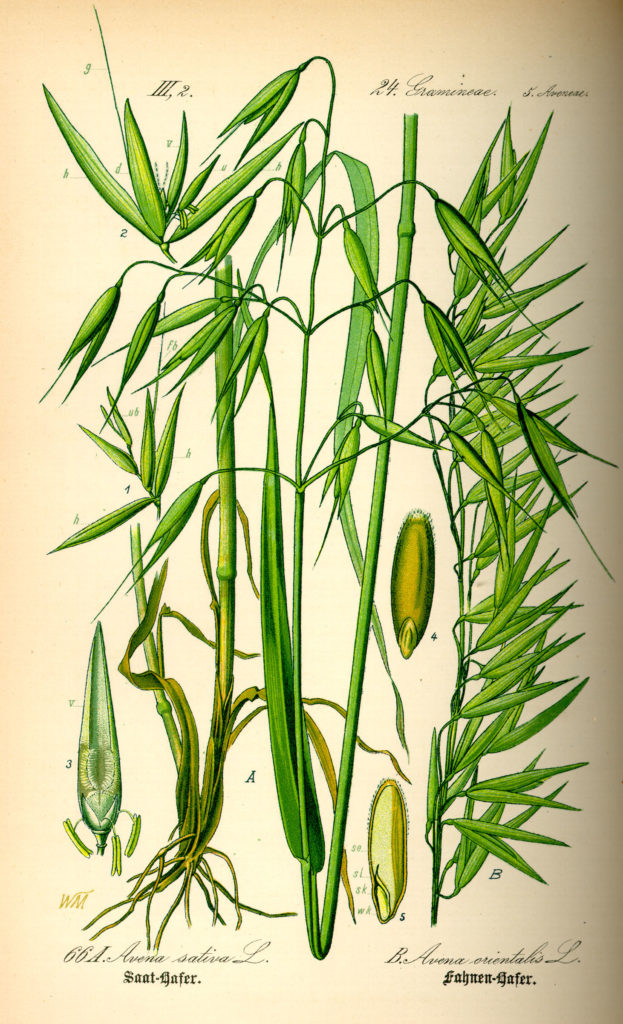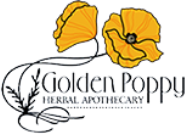
You have probably seen him. That little Honey Nut Cheerios Bee named Buzz. He zips around on television and tells everyone about just how
good oat-rich Cheerios are for lowering cholesterol, balancing diabetes and aiding in digestion. Buzz is right, but he is just hitting the surface of how strengthening this heart-healthy plant can be. There are three different aspects of this plant that are considered to be useful as herbal medicines: 1. The oats themselves, the part of the plant you can eat for breakfast or put into your bathwater, 2. The straw which is high in minerals and is made into a tea; 3. The seed in it's 'milky' stage, which is tinctured just before it dries to become the part that you eat. One of the most amazing and easiest ways to capitalize on the benefits of oat straw is to use it to nourish the surface of your body- such as skin, hair, and nails. Oat straw is rich in silicon, a mineral that is active in building hair, skin, nails, teeth, and bones. An individual exhibiting silicon deficiency can have poor bone development, thin or thinning hair, brittle nails, an increased formation of wrinkles and generally, aged-looking skin. Not only does the consumption of oat-straw tea promote healthy happy skin, so does the topical use of this herb. Oats can be used as a bath herb, lotion, salve or poultice. These applications are great for softening skin and relieving the itchiness of eczema, hive, rheumatism and neuralgia. Utilized as a compress, oat straw has been known to have a healing and restorative effect on scars and stitches. Internally oat straw is also used for the nervous system. Considered to be a trophorestorative for the nervous system (a fancy herbal term for tissue-repairing) oat straw and milky oat seed tincture are often used for conditions affecting the nervous system such as anxiety, tension, nerve damage and pain, PTSD, addiction, and more So if you're looking for an herb to help soothe your nerves, calm your irritated skin, or strengthen your nails, then this panacea plant may be the one for you.
MATERIA MEDICA: OAT STRAW
 Latin Name
Latin Name:
Avena fatua (wild oat), Avena sativa (cultivated oat) Family: Poaceae (Grass Family)
Part used: Stem (oatstraw) or seed (when unripe)
Energetics: Sweet, warm and moist
Actions: Antidepressant, antispasmodic, aphrodisiac, blood tonic, brain tonic, chi tonic, diaphoretic, diuretic, endocrine tonic, laxative, mood elevator, nervine, reproductive tonic, restorative and more!
Uses:
- Addiction
- Alcoholism
- Anxiety
- Bone Cancer
- Constipation
- Cholesterol
- Depression
- Diabetes
- Emotional Distress
- Hemorrhoids
- Insomnia
- Menopause Symptoms
- Nervousness
- Post-Traumatic Stress
- Withdrawal Symptoms
Preparation and Dosage:
-
Tea – 1/4 cup oatstraw in 1 quart of hot water, allow to steep overnight. Strain and drink throughout the day.
-
Tincture - fresh milky oat seed tincture: 60-90 drops 3-4 times/day
Safety considerations: If you have a known allergy or hypersensitivity to oats or plants in the Poaceae family, avoid utilizing this herb. Oat bran is safe for most people, including pregnant and breast-feeding women. However, oat straw can cause intestinal gas or bloating. To minimize these side effects, start by using a low dose of this herb and increase slowly with time. Beware of consuming oats if you are a Celiac or have gluten-intolerance. A large percentage of oat manufacturing facilities also process wheat. Gluten free oats are available at health and specialty food stores.
 You have probably seen him. That little Honey Nut Cheerios Bee named Buzz. He zips around on television and tells everyone about just how good oat-rich Cheerios are for lowering cholesterol, balancing diabetes and aiding in digestion. Buzz is right, but he is just hitting the surface of how strengthening this heart-healthy plant can be. There are three different aspects of this plant that are considered to be useful as herbal medicines: 1. The oats themselves, the part of the plant you can eat for breakfast or put into your bathwater, 2. The straw which is high in minerals and is made into a tea; 3. The seed in it's 'milky' stage, which is tinctured just before it dries to become the part that you eat. One of the most amazing and easiest ways to capitalize on the benefits of oat straw is to use it to nourish the surface of your body- such as skin, hair, and nails. Oat straw is rich in silicon, a mineral that is active in building hair, skin, nails, teeth, and bones. An individual exhibiting silicon deficiency can have poor bone development, thin or thinning hair, brittle nails, an increased formation of wrinkles and generally, aged-looking skin. Not only does the consumption of oat-straw tea promote healthy happy skin, so does the topical use of this herb. Oats can be used as a bath herb, lotion, salve or poultice. These applications are great for softening skin and relieving the itchiness of eczema, hive, rheumatism and neuralgia. Utilized as a compress, oat straw has been known to have a healing and restorative effect on scars and stitches. Internally oat straw is also used for the nervous system. Considered to be a trophorestorative for the nervous system (a fancy herbal term for tissue-repairing) oat straw and milky oat seed tincture are often used for conditions affecting the nervous system such as anxiety, tension, nerve damage and pain, PTSD, addiction, and more So if you're looking for an herb to help soothe your nerves, calm your irritated skin, or strengthen your nails, then this panacea plant may be the one for you.
You have probably seen him. That little Honey Nut Cheerios Bee named Buzz. He zips around on television and tells everyone about just how good oat-rich Cheerios are for lowering cholesterol, balancing diabetes and aiding in digestion. Buzz is right, but he is just hitting the surface of how strengthening this heart-healthy plant can be. There are three different aspects of this plant that are considered to be useful as herbal medicines: 1. The oats themselves, the part of the plant you can eat for breakfast or put into your bathwater, 2. The straw which is high in minerals and is made into a tea; 3. The seed in it's 'milky' stage, which is tinctured just before it dries to become the part that you eat. One of the most amazing and easiest ways to capitalize on the benefits of oat straw is to use it to nourish the surface of your body- such as skin, hair, and nails. Oat straw is rich in silicon, a mineral that is active in building hair, skin, nails, teeth, and bones. An individual exhibiting silicon deficiency can have poor bone development, thin or thinning hair, brittle nails, an increased formation of wrinkles and generally, aged-looking skin. Not only does the consumption of oat-straw tea promote healthy happy skin, so does the topical use of this herb. Oats can be used as a bath herb, lotion, salve or poultice. These applications are great for softening skin and relieving the itchiness of eczema, hive, rheumatism and neuralgia. Utilized as a compress, oat straw has been known to have a healing and restorative effect on scars and stitches. Internally oat straw is also used for the nervous system. Considered to be a trophorestorative for the nervous system (a fancy herbal term for tissue-repairing) oat straw and milky oat seed tincture are often used for conditions affecting the nervous system such as anxiety, tension, nerve damage and pain, PTSD, addiction, and more So if you're looking for an herb to help soothe your nerves, calm your irritated skin, or strengthen your nails, then this panacea plant may be the one for you.
 Latin Name: Avena fatua (wild oat), Avena sativa (cultivated oat) Family: Poaceae (Grass Family) Part used: Stem (oatstraw) or seed (when unripe) Energetics: Sweet, warm and moist Actions: Antidepressant, antispasmodic, aphrodisiac, blood tonic, brain tonic, chi tonic, diaphoretic, diuretic, endocrine tonic, laxative, mood elevator, nervine, reproductive tonic, restorative and more! Uses:
Latin Name: Avena fatua (wild oat), Avena sativa (cultivated oat) Family: Poaceae (Grass Family) Part used: Stem (oatstraw) or seed (when unripe) Energetics: Sweet, warm and moist Actions: Antidepressant, antispasmodic, aphrodisiac, blood tonic, brain tonic, chi tonic, diaphoretic, diuretic, endocrine tonic, laxative, mood elevator, nervine, reproductive tonic, restorative and more! Uses:



